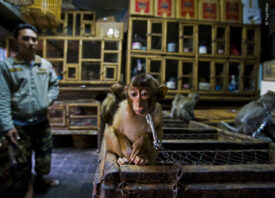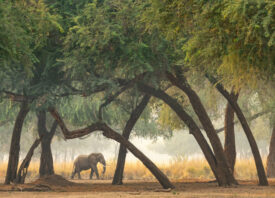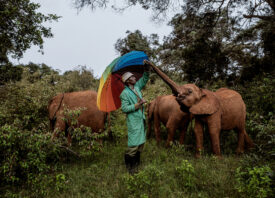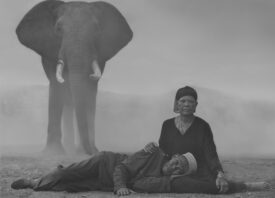Search this site
Rescuing the Pangolin, the World’s Most Trafficked Animal


“Most people don’t know anything about pangolins, never mind that they are near extinct,” the photographer Justin Mott tells us. He encountered these mammals, believed to be the most trafficked in the world, while visiting Save Vietnam’s Wildlife in Cuc Phuong National Park as part of Kindred Guardians, a long-term project about exploited animals and the humans who help them.
As a wildlife photojournalist, Mott has witnessed the plight of multiple species, but nothing could have prepared him for the pangolins. “The pangolin issue is easily the most underrepresented, and sadly, I feel it’s also the most pressing and dire,” he says. “They are overlooked simply because a lot of people don’t even know what they are. To many, they aren’t as cuddly or majestic as other animals in need, but I find them adorable.
“These vulnerable animals are trafficked mainly for their scales, which are believed to treat a variety of health conditions in traditional Chinese medicine (TCM), and as a luxury food in Vietnam and China. In Africa, pangolins are sold as a form of bushmeat, for ritual or spiritual purposes, and use in traditional African medicine. As the Asian pangolin is on the verge of extinction, the trade has turned to African pangolins.”

According to the World Wildlife Fund, an estimated 116,990 to 233,980 pangolins were killed based on reported seizures between 2011 and 2013. That number likely represents as little as ten percent of the total number of pangolins in the illegal wildlife trade. In the last 30 years, their population is believed to have declined by 80% to 90%.
“Pangolins are very temperamental, so they often die in transit,” Mott explains. Some of those who do survive suffer injuries or become sick; they are all stressed and frightened. After they are killed, illegally traded pangolins are used for their blood, meat, and scales, which are boiled off their bodies. As with rhino horn, pangolin scales have no proven scientific benefits. “They are slaughtered for a myth, and it’s a horrific industry,” Mott says.
“I always have the same mixed emotions when I photograph stories for Kindred Guardians. I’m deeply saddened, disappointed, and angry with humanity, but I am also inspired by the people who battle and dedicate their lives to helping these animals.”

In this case, those people were the keepers and veterinarians at Save Vietnam’s Wildlife, who rehabilitate pangolins confiscated from the illegal wildlife trade. One of the keepers he met, Dinh Van Tham, had devoted eighteen years of his life to the center. To date, they have rescued more than 1,330 pangolins, with 60% being released back into the wild. Most of the pangolins in their care will be released into the wilds of Cát Tiên National Park when they are ready.

“Pangolins are nocturnal, so I had to wait until evening to see them,” Mott remembers. “They are very hard to photograph, even in captivity. Their scales are so thick and strong that when they coil up, they look like a scaley bowling ball. Another thing that struck me is their amazingly long tongues. Their tongues can reach up to forty centimeters and can be longer than their actual torsos.”
Unfortunately, the road to recovery can prove difficult for even some of the lucky pangolins. “Rescued pangolins often don’t live long lives, as the trauma of the captivity can be deadly for them,” Mott says. “I was at the Pangolin center when a pangolin hadn’t surfaced in a couple of days. They had to dig for her. They eventually found her dead under the soil.” She was five years old and one of only eight Chinese pangolins at the center. As humans, we still don’t know why pangolins often die in captivity, so it’s difficult to prevent it.


Still, Mott’s time with Save Vietnam’s Wildlife has given him a gleaming sliver of hope to hold onto. Daily, the caregivers fought tirelessly to give the animals a second chance in the wild or, in some cases, at the rescue center. A pangolin named Polly, for instance, who came to the center in 2017, was found missing a leg, so she can’t return to the wild. Instead, she will remain at the center in her naturalistic enclosure, where she has branches to climb, soil to dig, and hollow tree logs for snuggling.
During the COVID-19 pandemic, Nguyen Xuan Phuc, the prime minister of Vietnam, issued a directive to crack down on the wildlife trade, a first step in the right direction for pangolins and other animals. “I just hope these laws are enforced,” Mott says. “The illegal wildlife trade is a terrible industry, and whether or not it’s responsible for COVID-19, it’s definitely responsible for wiping out species and supporting all sorts of other criminal activities, resulting in the deaths of humans.
“I also hope that the younger generation here in Vietnam understands the consequences of this illegal wildlife trade–that it’s not just animals dying. These are criminal organizations; people die as well, and so do entire ecosystems. I’m hopeful they won’t fall for the myths and promises trumpeted by the criminals that peddle these products. Without a demand, the industry will fail.”


To support the protection of the vulnerable pangolin, please consider making a donation to Save Vietnam’s Wildlife. You can also adopt a pangolin like Polly with a yearly donation of just $50. Your donation will cover the expense of the fresh food, veterinary supplies, enclosure maintenance, and environmental enrichment she needs to thrive. Mott’s project Kindred Guardians is self-funded; you can follow his work via his website and on Instagram at @askmott.




